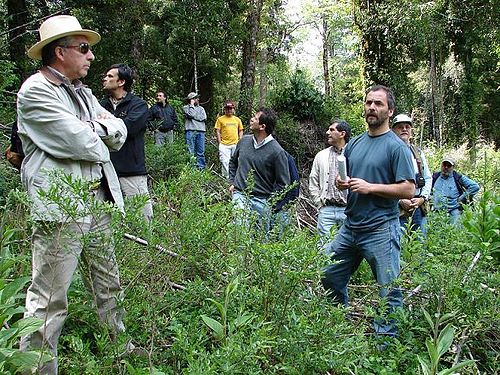 | This article has multiple issues. Please helpimprove it or discuss these issues on thetalk page.(Learn how and when to remove these messages) (Learn how and when to remove this message)
|

Aforester is a person who practisesforest management andforestry, the science, art, and profession of managingforests. Foresters engage in a broad range of activities includingecological restoration and management ofprotected areas. Foresters manage forests to provide a variety of objectives including direct extraction ofraw material,outdoor recreation, conservation, hunting and aesthetics. Emergingmanagement practices include managing forestlands forbiodiversity,carbon sequestration and air quality.
Foresters work for thetimber industry, government agencies,conservation groups, local authorities,urban parks boards, citizens' associations, and privatelandowners. The forestry profession includes a wide diversity of jobs, with educational requirements ranging from college bachelor's degrees to PhDs for highly specialized work.
Industrial foresters plan forest regeneration starting with careful harvesting. Urban foresters manage trees inurban green spaces. Foresters work intree nurseries growingseedlings for woodland creation or regeneration projects. Foresters improve treegenetics. Forest engineers develop new building systems. Professional forestersmeasure andmodel the growth of forests with tools likegeographic information systems. Foresters may combatinsect infestation, disease, forest andgrasslandwildfire, but increasingly allow these natural aspects of forestecosystems to run their course when the likelihood ofepidemics or risk of life or property are low. Increasingly, foresters participate in wildlifeconservation planning andwatershed protection. Foresters have been mainly concerned with timber management, especiallyreforestation, forests at prime conditions, and fire control.
Many people confuse the role of the forester with that of thelogger, but most foresters are concerned not only with the harvest of timber, but also with thesustainable management of forests. The forester Jack C. Westoby remarked that "forestry is concerned not with trees, but with how trees can serve people".[1]

The median salary of foresters in theUnited States was $53,750, in 2008.[2] Beginning foresters without bachelor's degrees make considerably less. Those with master's degrees are able to command salaries closer to the average. TheCouncil for Higher Education Accreditation considers theSociety of American Foresters as the principalaccreditor for academic degree programs in professional forestry, both at aBachelor's andMaster's level.[3]
Usually a bachelor's degree is considered the minimum education required, but some individuals are able to secure a job without a college education based on their experience. Some states have a licensing requirement for foresters, and most of those require at least a four-year degree.
Foresters are often employed by private industry, federal and stateland management agencies, or private consulting firms.[4]
Forester was a title used widely duringMedieval times. The forester usually held a position equal to a sheriff or local law enforcer, and he could act as a barrister or arbiter. He was often based in aforester's lodge, and was responsible for patrolling the woodlands on a lord or noble's property, hence the synonymous term 'woodward'. His duties included negotiating sales of lumber and timber and stopping poachers from illegally hunting. Frequently outlaws would take refuge in heavily wooded regions. When this occurred it was the duty of the forester to organize armedposses to capture or disperse the criminals and during war time foresters were used as scouts to spy on enemy troop movement.The pay and status of foresters was usually above average,[5] reflecting the responsibility of their role in a medieval environment and economy.